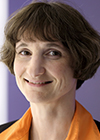Plenary Speaker

What's Next in Computing – From Bits to Qubits
Heike E. Riel
IBM Research
Abstract: Classical computers which represent information as bits have evolved over many years in an unprecedented way and became ubiquitous in our life through sustained innovation. Reducing the power consumption and increasing the performance as well as density will remain the driving force for future innovation. In addition, specialized technologies are developed to accelerate a variety of workloads, such as hardware for artificial intelligence (AI) including digital reduced-precision accelerator approaches, or non-von-Neumann analog devices.
Despite the continued computational advances, there are still many important and relevant problems that are intractable to classical computers but could be addressed by Quantum Computers. Quantum computing systems are built from the bottom up and are reaching today the limits of what can be classically simulated. We are developing the entire quantum computing stack starting from the qubit and quantum processor technology, control electronics to software, algorithms, and applications for quantum computing. Significant advances have been recently achieved that enabled to scale superconducting qubits to a 127-qubit processor and increase quality and speed to improve the performance of quantum computation. In this presentation I will give an overview of our activities in the field of new computing paradigms of AI hardware technologies and quantum computing.
Biography: Dr. Heike Riel is IBM Fellow, Head of Science & Technology and Lead of IBM Research Quantum Europe & Africa. She leads the Science & Technology department aiming to create scientific and technological breakthroughs in Quantum Computing and Technologies, Physics of Artificial Intelligence, Nanoscience and Nanotechnology and to explore new directions to computing. Her research has contributed to advancements in OLED display technology, molecular electronics and semiconductor nanoscale materials and devices.
She received the masters in physics from the Friedrich-Alexander University of Erlangen-Nürnberg and the PhD in physics from University of Bayreuth (Germany) and an MBA from Henley Business College (UK). In 2003, she became a Research Staff Member and, was leading teams in semiconducting nanowire research, materials integration and nanoscale devices. From 2015 till end of 2018, she had been at the IBM T.J. Watson Research Center leading the Physical Sciences and then the IoT Technology and AI Solutions Department. She has authored more than 150 peer-reviewed publications and filed more than 50 patents.
She has received several prestigious honors, e.g., elected member of the Leopoldina – German National Academy of Sciences and the Swiss Academy of Engineering Sciences; the APS David Adler Lectureship Award in the Field of Materials Physics, the 2022 IEEE Andrew S. Grove Award, Fellow of the American Physical Society, honorary doctorate by Lund University.